Decoding trading signal systems can feel like unraveling a mystery. But here’s the truth: they’re your ticket to making smarter investments and achieving financial freedom. So, let’s dive in and pull back the curtain on these powerful tools that can guide your trading decisions.
Contents
- What Are Trading Signal Systems?
- Why Trading Signal Systems Matter
- Types of Trading Signal Systems
- How to Choose the Right Trading Signal System
- The Benefits of Using Trading Signal Systems
- Common Myths About Trading Signal Systems
- Practical Tips for Using Trading Signal Systems
- The Future of Trading Signal Systems
- Where to Find Reliable Trading Signal Systems
- Bottom Line
- FAQ
What Are Trading Signal Systems?
Trading signal systems are tools designed to help traders make informed decisions. They analyze market data, identify trends, and generate signals to buy or sell an asset. This is significant because it transforms the often-overwhelming world of trading into a more manageable and strategic process.
You don’t have to be a financial expert to benefit from these systems. Whether you’re a seasoned trader or just starting, understanding how to decode trading signal systems can elevate your investment game.
Why Trading Signal Systems Matter
Think of trading signal systems as your personal investment coach. They:
- Simplify complex data
- Provide timely insights
- Enhance your decision-making
When you know what to look for, you can make choices that align with your financial goals. This isn’t just about making money; it’s about gaining confidence in your financial journey.
Types of Trading Signal Systems
1. Technical Analysis Signals
These signals are based on historical price data and market behavior. They often include:
- Moving Averages: Helps identify trends.
- Relative Strength Index (RSI): Indicates overbought or oversold conditions.
- Candlestick Patterns: Visual representations of price movements.
Using these tools can help you spot potential entry and exit points effectively.
2. Fundamental Analysis Signals
Fundamental analysis focuses on the intrinsic value of an asset. Key indicators include:
- Earnings Reports: Vital for stocks.
- Economic Indicators: Such as GDP growth or employment rates.
- News Events: Geopolitical events can sway market sentiment.
By keeping an eye on these factors, you can anticipate market movements and position yourself advantageously.
3. Sentiment Analysis Signals
These signals gauge market sentiment through social media trends, news articles, and investor behavior. Tools like Google Trends or social media analytics can provide real-time insights into what the market is feeling.
How to Choose the Right Trading Signal System
Selecting the right system can feel daunting, but it’s crucial. Here are some factors to consider:
- Your Trading Style: Are you a day trader, swing trader, or long-term investor?
- Market Focus: Stocks, forex, cryptocurrencies, or commodities?
- User-Friendliness: Is the system easy to navigate?
Don’t hesitate to try a few systems until you find the one that resonates with you.
The Benefits of Using Trading Signal Systems
1. Increased Efficiency
You save time by not having to analyze the market manually. Instead, you can focus on what matters most—making informed decisions.
2. Reduced Emotional Trading
Trading can be emotional. Trading signal systems offer objective insights, helping you stick to your strategy without being swayed by fear or greed.
3. Backtesting Capabilities
Many systems allow you to backtest your strategies. This means you can see how a signal would have performed historically before risking your hard-earned money.
Common Myths About Trading Signal Systems
Myth 1: They Guarantee Success
No system is foolproof. Trading involves risks, and it’s essential to understand that while these systems can enhance your decision-making, they don’t eliminate risk.
Myth 2: They’re Only for Experts
Trading signal systems are designed for everyone. With a little practice and understanding, anyone can use them effectively.
Myth 3: They’re Too Complicated
Many systems are user-friendly and come with tutorials. You don’t need an advanced degree to decode trading signal systems.
Practical Tips for Using Trading Signal Systems
-
Stay Informed: Keep up with market trends and news. Systems are most effective when used in conjunction with your own research.
-
Combine Signals: Don’t rely on one signal alone. Use a combo of technical, fundamental, and sentiment analysis for a more rounded approach.
-
Set Realistic Goals: Be clear about what you want to achieve. This helps you stay focused and measure your success.
-
Practice Patience: Great trades don’t happen overnight. Allow time for your strategies to unfold.
-
Keep a Trading Journal: Document your trades, strategies, and outcomes. This will help you refine your approach over time.
The Future of Trading Signal Systems
As technology evolves, so do trading signal systems. Artificial intelligence and machine learning are revolutionizing how these tools operate, making them more accurate and efficient. Staying ahead of these trends is essential for any investor looking to thrive.
Where to Find Reliable Trading Signal Systems
- Trading Platforms: Many brokerages offer built-in signal systems.
- Independent Software Providers: Research reputable companies that specialize in trading signals.
- Online Communities: Join forums and social media groups to share insights and recommendations.
Bottom Line
Decoding trading signal systems is about more than just numbers; it’s about empowering yourself to make smarter, more informed investments. With the right tools and a bit of practice, you can navigate the trading landscape with confidence.
Take the plunge; explore the world of trading signal systems today, and start your journey toward smarter investments.
FAQ
What is the best trading signal system for beginners?
Look for user-friendly platforms that offer educational resources, such as MetaTrader or TradingView.
Are trading signal systems worth the investment?
Absolutely! They can save you time, reduce emotional trading, and enhance your decision-making process.
Can I trust free trading signals?
While some free signals can be useful, always do your due diligence. Research the source and be cautious of overly promotional claims.
You’ve got this! Embrace the journey ahead—your smarter investment strategy awaits.








